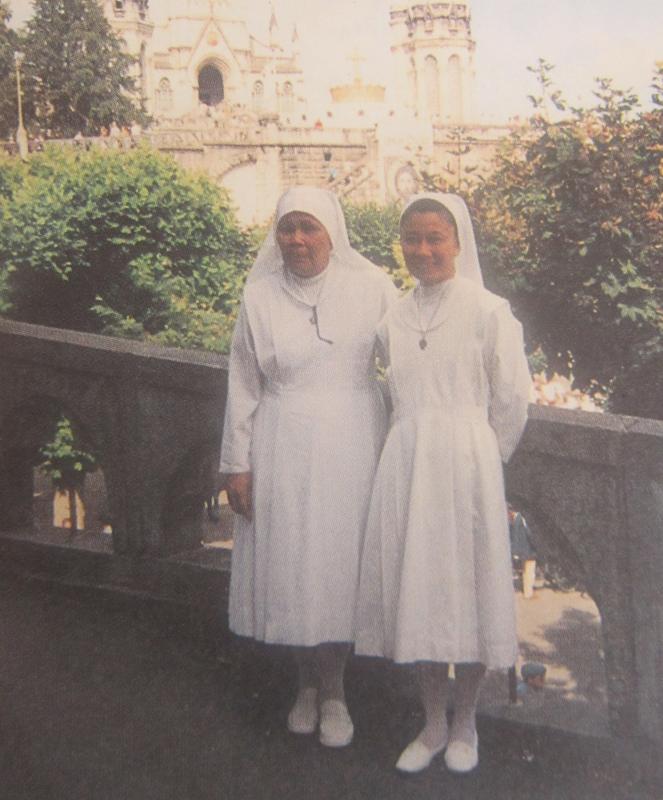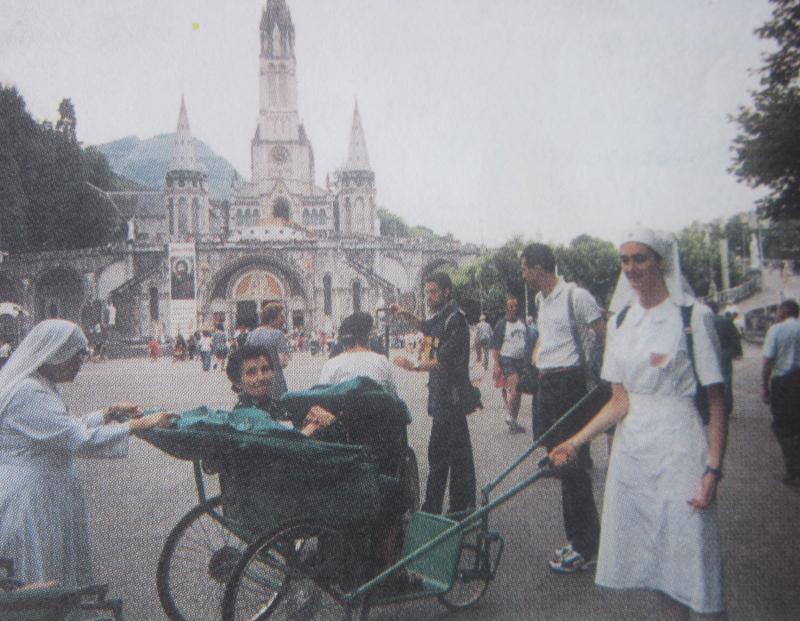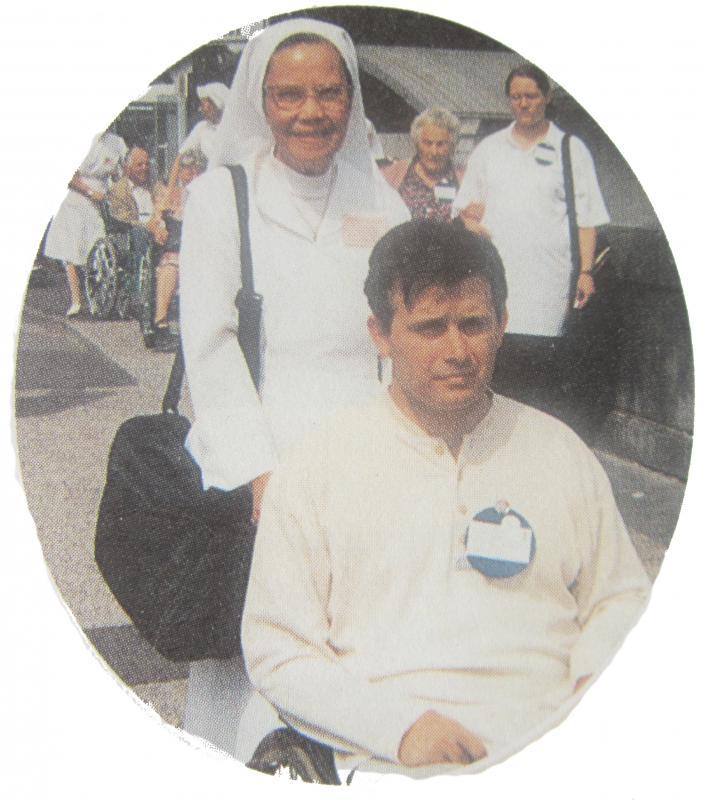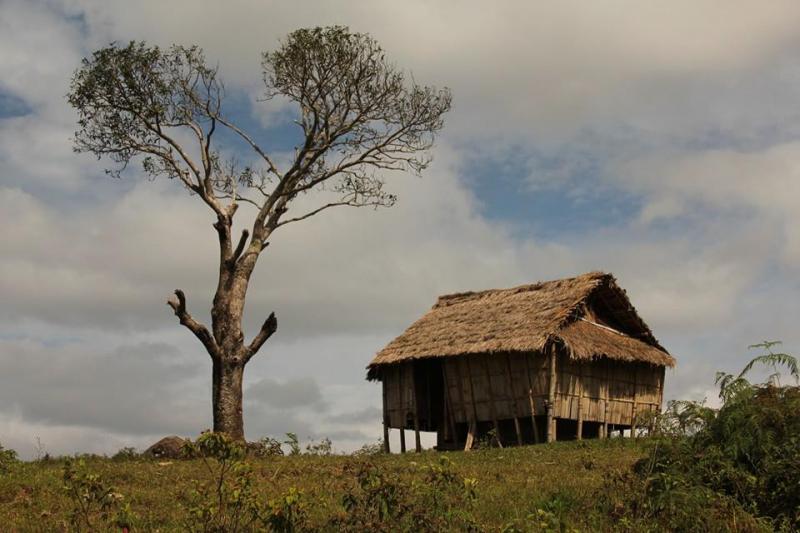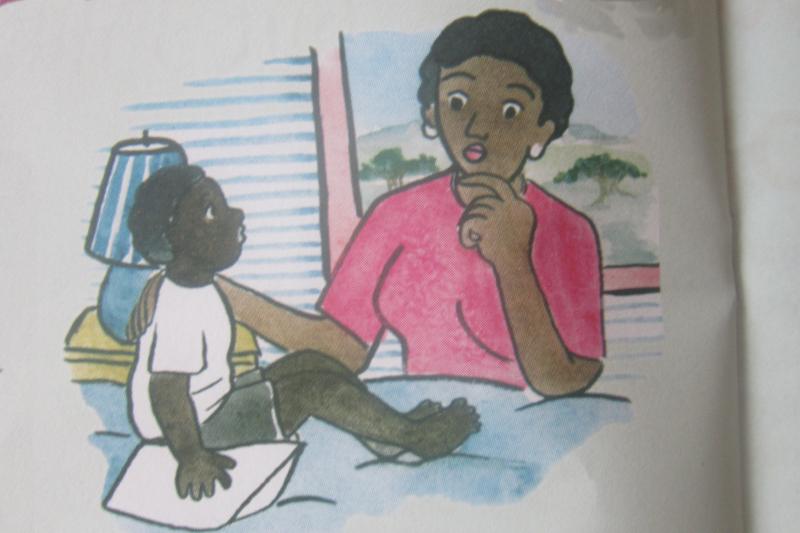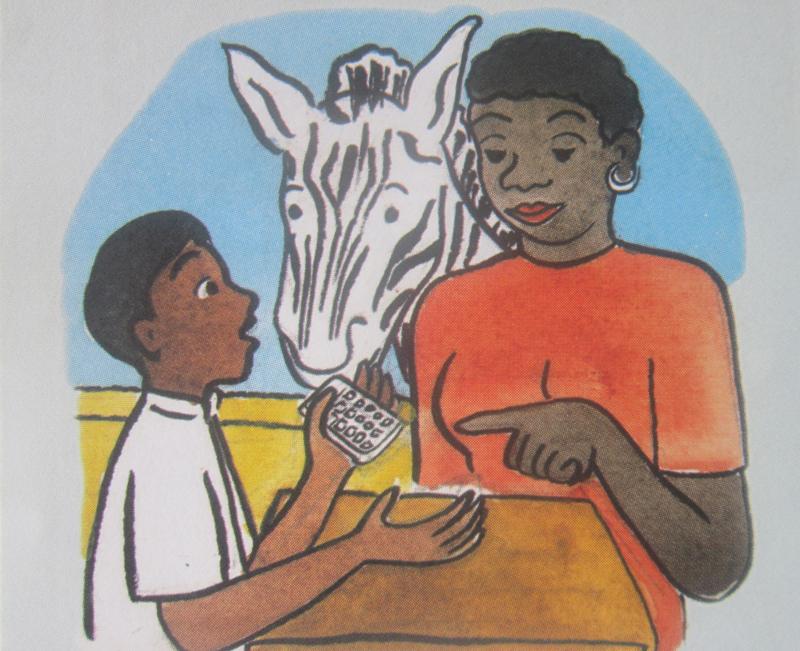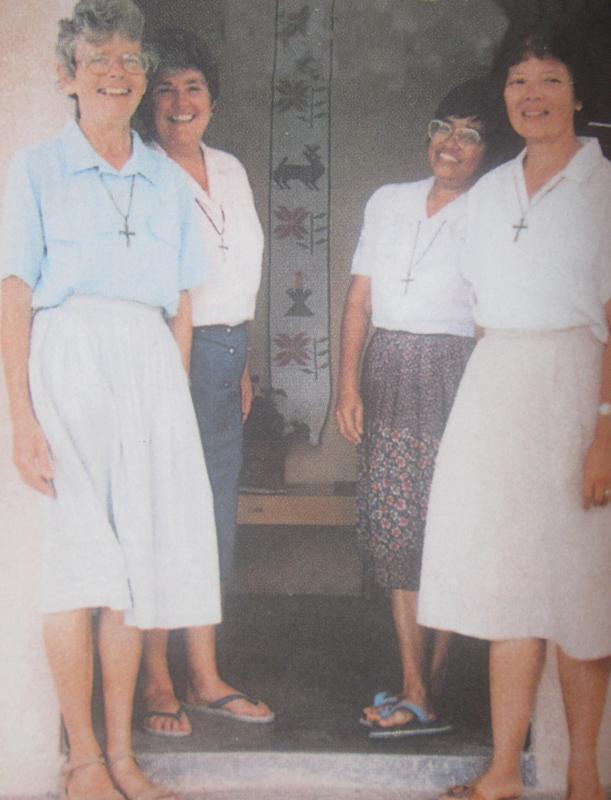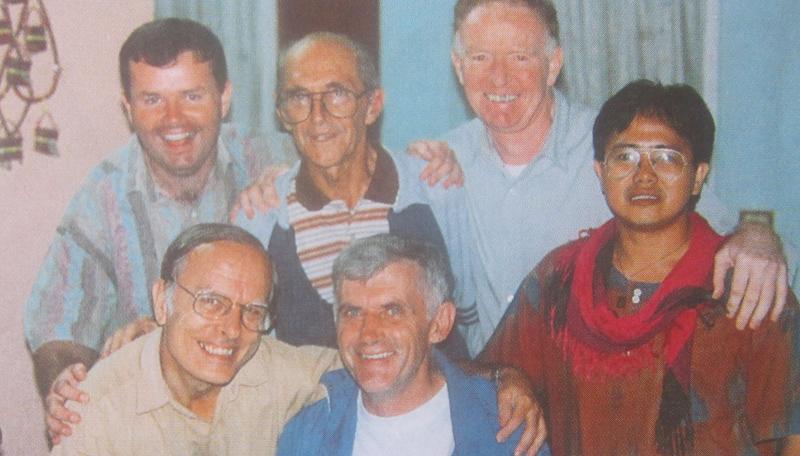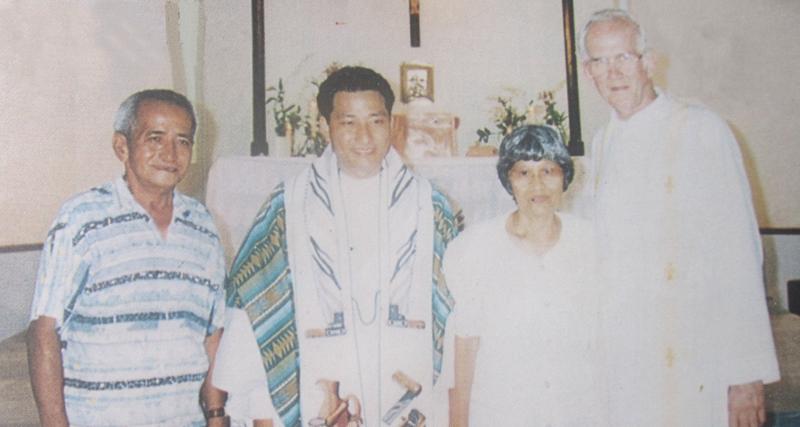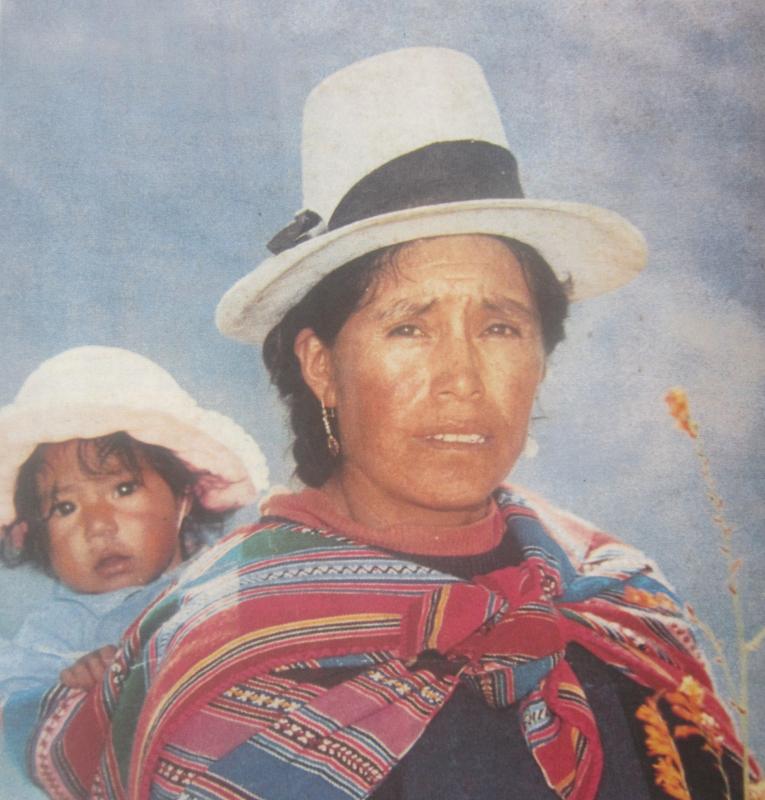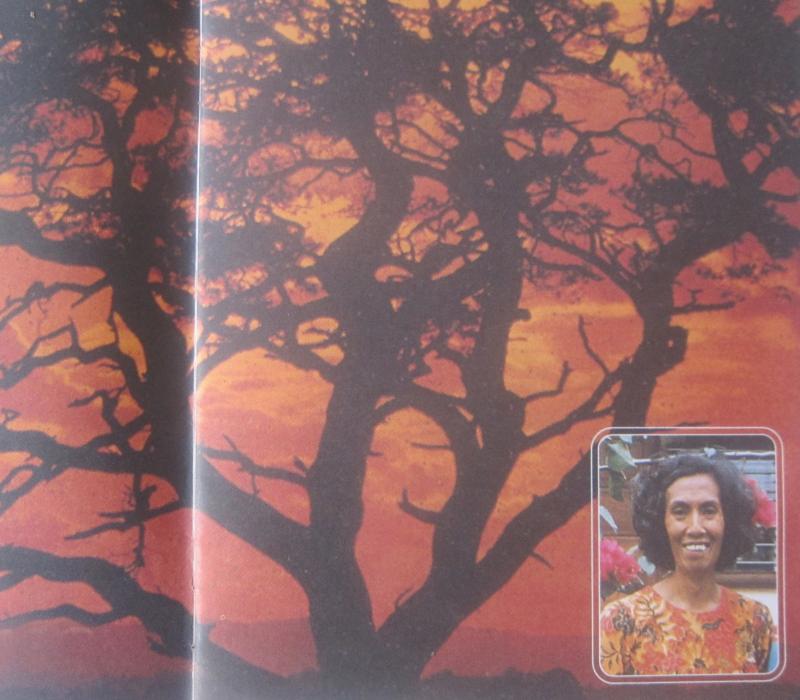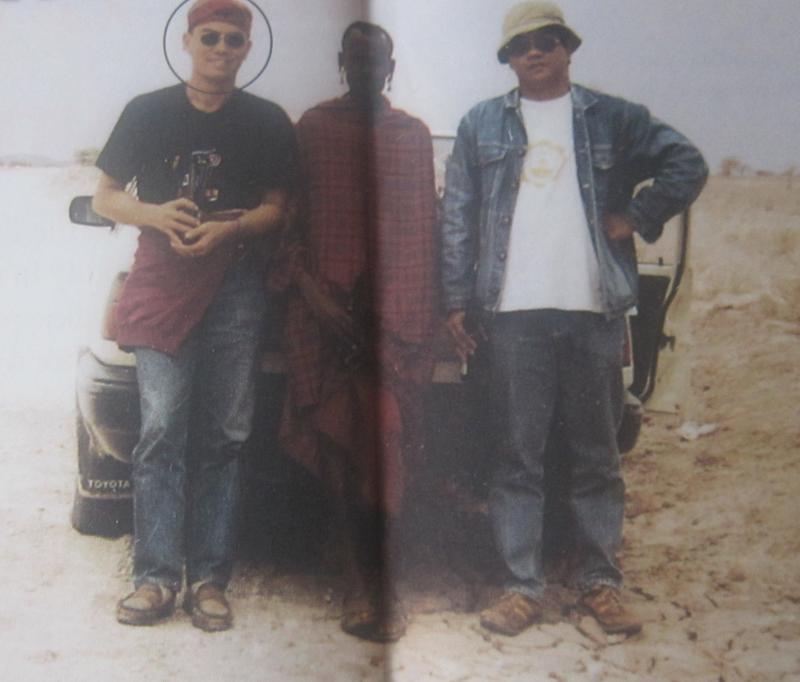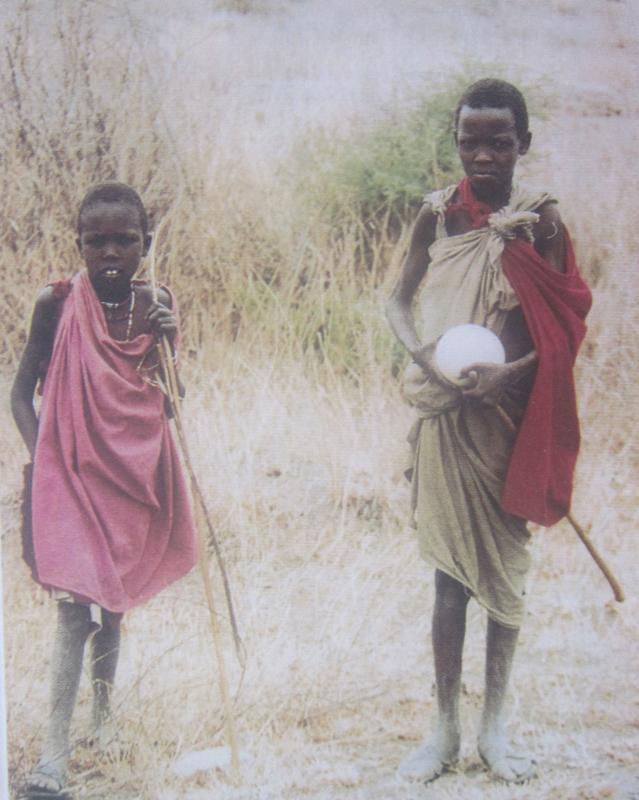November-December 1998
A Grain of Salt
By Fr. Jaime Del Rosario, omi
I came here in Japan 1996, I was ordained in September, 1995 at the Our Lady of Grace Parish in Caloocan City as an O.M.I. priest. I ministered in that Oblate Parish as a deacon and then as a priest for some months. Coming to Japan as a new priest, at the age of 28 is a really challenging mission for me.
The Oblates are known to going for the most difficult missions. As a seminarian I had a great desire to go the difficult missions, particularly in foreign lands. I thought that it was a noble self-offering to the Lord. But now that I’m into a difficult mission, I begin to realize that “difficult” really is difficult.
I am studying ‘nihon-go right now at Nanzan University in Nagoya. The Language is totally different. It uses Chinese characters too that I have to learn to read and write. The Japanese society is highly secularized and economically affluent. People are busy and have no more time for community life. Their life revolves around functions: work, study and household-chores. During my school breaks, I help out in our Oblate parishes. It is a new experience for me to celebrate Mass with only about 6 people on a Sunday. Our bigger church would have 200 people at the most.
.06 of Population
A first-world economy, with a third-world Catholic Church aptly describes the mission situation in Japan. Yes, Japan, as a nation is highly industrialized. But, the death of its Catholic members keep the Church at a humble stance in society. There are only about 717, 541 Catholics in Japan; 289, 808 of which are Filipinos and Hispanic. Of the 125. 7 million people, Catholics are only 0.06% of the population. Quite gentle voice in a mammoth crowd aren’t we?
Militarist Ambitions
Now, what should be Christ’s mission among the Japanese people today? Francis Xavier must have asked the same question in introducing Christianity here in 1549. But, at that time the Japanese rulers feared a Europeans in the 1600’s and eventual persecution of Christians converts. However Japan was forced to open its closed-door policy only in the 1860’s. Then its gradual rise to economic power led to its militarist ambitions, which were quelled when it lost the Second World War. It was from that period (1946) onwards that a new Japan was established, oriented now towards peace and economic progress.
Oblates Arrive
It was at that stage that in 1948 the Oblates of Mary Immaculate started their mission in Japan. In the intervening 50 years, 6 Japanese have become oblates. Considering the number of Catholics here, that is a good enough harvest. We are currently blessed with 3 seminarians. The 23 Oblates at present are involved in parishes, kindergarten schools, with the deaf, Pro-life, alcoholics, orphans migrant workers, the youth, vocation and lay movements.
The Marginalized
How to continue the mission? We have to listen to what the Holy Spirit is telling us. Today, Japan is a top economic power. The people feel self-secure as to their financial needs. But they do not feel secure with regards to the deeper meaning of life and interpersonal bonding. The highly-urban life can be monotonous and empty. Those who cannot keep up with social standards we marginalized. But this where Christ dwells – among the marginalized and the poor in spirit.
We were Found
We who already have known Christ have the duty to proclaim that we not longer have to search for meaning aimlessly. We were already found by our only ground for hope –a witness to Christ’s love, humility and service. No matter how small we Christian are here in Japan, we have the humble role as salt and leaven of the Kingdom of God.
A Visit to Lourdes
By Sr. Martina Machacon, oss
Filipino Oblate Sisters based in Italy pay a visit to Lourdes and there they pitch in to help the sick.
Sr. Martina with Sr. Lourdes Beunsuceso. Sr. Lourdes joined the pilgrimage to Lourdes, too.
Sr. Martina Machacon has been on mission in Iran, Lebanon and Rwanda. She had to flee from Rwanda during the terrible massacres, now she is in their mother house in Lucca, Italy. Recently she volunteered to assist the sick pilgrims to Lourdes.
Sr. Ma. Margherita Villaluz also accompanies the sick to Lourdes. Sr. Margherita had been assigned for 11 years in Rome. Now she has been assigned in Lucca, Italy.
Candle in the Dark
By Mandy Ochoa
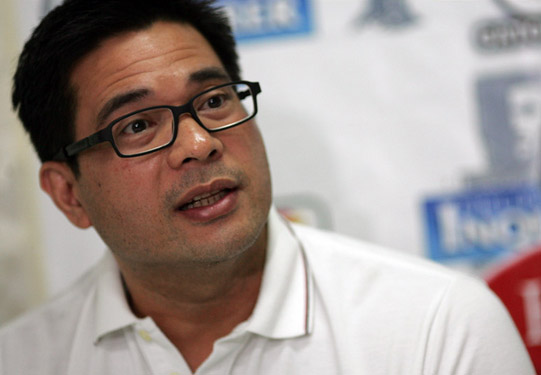
Photo Courtesy : Abs-Cbn
I felt I was on top of the world I had everything I wanted: fame, girls, my own car and my own house. But I wasn’t happy I felt empty inside.
My real name is Emmanuel which means God is with us. It is a name that holds a special significance during Christmas time because it’s the same name that was given the Lord Jesus Christ when he was born in Bethlehem – God coming to the world to be among us. And now that Christmas is just around the corner, I feel that special affiliation to Jesus once again. I feel lucky to have been named after Him. And I join the rest of the world in welcoming the wonderful, joyous Christmas season, at the same time commemorating the birth of our Savior and joining in the merry revelry that comes with the season.
Broken Marriage
But I did not always feel this way about Christmas. Nor about Jesus Christ, Nor about my family. As far back as I could remember, my life had always been miserable, and my unhappy childhood started when, at age 8, I became a hapless victim of broken marriage. My parents went their separate ways. If my three older sisters and I never did entertain hopes that they would still get back together and we would become one big, happy family once again, those hopes were shattered when my mother got a divorce in the United States and then married an American when I was 12.
Step Father
I had to live with my mother and her new husband in the U.S. Being separated from my real father was painful enough. But what made it an even more heartbreaking experience for me was that I did not get along with my stepfather. He tried to control my life, and I would not let him. I confess, I hated him, but because I loved my mother and did not want to be separated from her, too, I had to endure the kind of life I had.
Did not ‘know’ God
Back then, I felt so alone, so lonely, and because of it, I felt that God was a God who was difficult to reach, he seemed so far away. He was simply not there for me. Since I was raised by my real parents as a good Catholic, I did not believe in God, but my knowledge of Him was based only on what I had been taught. I prayed the standard prayers like Our Father, Hail Mary and Glory Be, I went to church every Sunday, and I grew up believing in God but not really knowing Him personally.
New World
When I turned 18, I decided that enough was enough between my stepfather and me, I came back to the Philippines for a vacation, and I ended up joining the world of modeling. I found out that I could have a wonderful social life and I could get all the attention I needed in my New World. I played basketball to keep fit. I took drugs, too, and I did not feel the least bit guilty about it.
New Life, new direction
My life took a different direction when I met Douglas Quijano, a successful talent agent, in Los Angeles back in 1993. He offered to help me embark on a career in show business. I accepted his offer and was soon back in Manila to give it a try. Aside from doing movies, I also did one commercial after another.
Ozone Disaster
That time, I felt I was on the top of the world. I had everything I wanted: fame, girls, my own car and my own house. But I wasn’t happy. I still felt empty inside, I thought things would change when I met Ina, a beautiful model, in 1995 and she became my girlfriend. But death robbed her from me. On that fateful Monday, I was deep into the rehearsals for play titled Kristo, where I played Peter. A message came through my pager. It came from Ina, who was at the Ozone Disco with her relatives. She wanted me to follow them to the disco as soon as I was through with rehearsals. I did not make it, though, since my rehearsal lasted deep into the night.
The following morning, I received the shock of my life. There, all over the papers, was the news that fire ate up Ozone Disco the night before. Immediately, I thought of Ina and checked on her. But she was gone. Gone forever, I could not believe that it was happening to me. I came so close to death and I survived, but I lost Ina in the process. For weeks, I just flowed with the tide. I did not have the zest that I used to have for life.
Oasis of Love
My co-actors, who were doing Kristo with me, noticed the change in me, especially since I spent a lot of time crying in the restroom. My co-actors, Rez Cortes approached me one time. He told me he belongs to a Charismatic community called the Oasis of Love which is composed mostly of people from show business -- actors, directors. He invited me to a Life in the Spirit Seminar to be conducted by the Oasis of Love Community. I had been invited several times in the past, but I always declined. This time, I accepted the invitation. I needed something, anything, to get my mind off Ina and the tragedy that befell her.
Let Go
The Baptism in the Holly Spirit led by Father Sonny Ramirez, spiritual Director of the community, that took place during the seminar turned out to be an electrifying experience for me, when the others were praying over me I felt electricity rushing from my head to my toes. I saw my hands and fingers deform like a crab, and my body slanted and came close to falling, I heard a voice in my heart say, “Don’t worry, I’m holding you. You won’t fall.” I raised my hand and surrendered all my heartaches, fears and disappointments to God. When Father Sonny whispered to me,” My son, let go,” I felt that I was cleansed.
Candle in the Dark
I belong to the world of show business and temptations lurk at every nook and cranny. But I always try to be a candle in the dark, whenever possible, I requested my directors to start our shooting sessions with a prayer. Oftentimes, they oblige, seeing the wisdom and the power of prayers. That was exactly what happened when I did the Johnson’s TV Commercial where I held a baby close to my chest. I prayed for the part and got it. On the shooting day itself, I asked the director if we could start with a prayer, and he agreed. Everyone involved in the production formed a circle and I led the prayer. When it came time to do the actual shoot everything fell into place. As I approached the crib and lifted the baby up, tears fell from my eyes and I felt the love that exist between a father and a child between me and my father in heaven.
Emmanuel
I belong to the world of show business, which can sometimes be a breeding ground for sin. But I try to make a difference, choosing my roles and movies carefully, refusing to curse even if it’s in the script and always trying to be upright and right in His eyes. But I am not perfect, and sometimes my candle flickers. There are times when the light goes out completely. But I always search for a match in the darkness and use it to light my candle again. My source, of course, is the one after whom I was named Jesus, the Emmanuel, the light that began to illumine the world - yours and mine – on the first Christmas day.
Salamat sa Kerygma
Earth can't belong to us, for we belong to it
By Fr. Sean Farell
Sean Farell is a Columban lay missionary in Mindanao where he tries to help the ‘lumads’ in their struggles for a little land to live on recently the ‘lumads’ have been forced to go on o hunger strike to get their land returned to them. This poem has been born out of their tears. Here is an extract:
Many different faces
March a single beat
Footsteps fall together
In mid-day summer’s heat.
Hands hold high banners,
Splashed worlds of red,
“You will not rape this land,
which we have gently fed.”
You cannot hear its message,
Your ears so stuffed with greed,
You stable in the dark,
For the wretched gold you need.
How can you own the sun,
Or possess a gentle breeze?
How can you buy the earth
When it’s been here for all time?
Your life but a second
To its eternal rhyme.
How can you take rock
And rape from stone its heart,
When that which you destroy
Is of what you are a part?
This earth on which you stand,
so scared to its core,
from this we take our life,
From each and every pore?
You cannot see the truth
That’s shattered in your pit;
Earth can’t belong to us,
For we belong to it.
Father Joeker

By Fr Joseph Panabang SVD
Father Joe would like to thank all those who sent him letters and greetings. He doesn’t always get around to answering everyone but assures you of his gratitude.
Dreaming
Joseph Kojo Baffoe, a four-year-old child, is very talkative and inquisitive. He lost his father. He was bought to Kintampo by his mother and left to his Aunt Yaa. He woke up one morning and asked, where is my father? He brought me to a far far place last night.” Knowing it was a dream, his aunt said, “Oh Joe, it means you were dreaming.” “What is dreaming Mama?” he demanded and poor Aunt Yaa was completely at a loss.
Calculating Remark
At Dawa Dawa Village, I was using the calculator to balance our parish accounts. “You have a nice calculator” remarked one of the villager. “Yes, I have a nice calculator. But I have very little to calculate,” I counter remarked.
Day becomes Night
“How is your prayer life?” asked an excited Holy Spirit Sister during our sharing. “Not so bad. In fact. If often say my morning prayer in the evening,” I replied to her confusion.
Wooden Bed
Sr. Wilfredis Jacob, SSpS and Sr. Juliana Conterius, SSpS from the Philippines and Indonesia were in Kintampo for a drop-in visit. Looking at my bed in the corridor, they remarked, “Oh, you are rich, Father, Imagine you have two beds; one here and the other one in your room.” “You should be very grateful Sisters that there are still missionaries today who still find it meaningful to sleep on wooden bunks,” I quipped. The two Sisters looked at me intently and suspiciously as if to say, “This time you are not joking.”
Getting Old
Fr. Martin Wells, SVD and Fr. Clement Hotze, SVD both elderly priests were among the participants in our On-going Priests Formation at Nsawam Catholic Conference Center, near Accra, capital of Ghana. During coffee break, both were struggling to open a biscuit. Each however was overjoyed when they succeeded, unaware of what happened, I joined them at the table, took a biscuit, opened it easily by following the arrow as indicated on the wrapper. Surprised, Fr. Martin Wells, in his gentle voice asked, “How did you do that, Father? Fr. Clement and I both had to struggle to open them.” With respect I replied, “It is very easy, Father. But at a certain age, you simply forget how to open it.” How sweet but how funny too to see old people smiling from ear to ear. (By the way, have you ever seen a toothless smile? It is contagious for it generates more smile.)
Prayerful Ducks
Trying to help ourselves, we started a poultry with ducks at the back of our mission house. To protect the ducklings from being pecked, we enclosed them separately; one mother duck and its ducklings in each screened enclosure.
An SSpS Sister and a Novice Mistress were so curious about the procedure that she asked many questions. Then I explained to her, “You see, we put, them separately in small cottages so it will be easier to teach them how to pray. she just looked at me with steely eyes as if to say; “Fr. Joe, stop pulling my leg.”
Hope...amid Tears
By Sr. Janice McLaughlin, mm
Maryknoll Sisters see peace building at heart of their service to the people of East Timor.
East Timor’s Bishops Carlos Ximenes Belo issued an SOS for his people, and Maryknoll Sister’s responded, four missionaries now one a Filipino, serve in this “land of tears.”
Massacre
Nine days after East Timor declared its independence in 1975, Indonesia invaded the former Portuguese colony and killed 60,000 people, including innocent civilians as well as armed rebels. With the Indonesian army continuing its iron-fisted rule, Bishops Belo said “We are dying as a nation and as a people.” He invited religious congregations to come and help them, the Maryknoll Sisters working in neighboring Java accepted the invitation and arrive in Dili, the capital, in 1991. They are stationed in Aileu, a mountainous are south of Dili.
International group
Sister Harriet Lum, from Honolulu, Hawaii, Nora Maulawin, from Manila, Philippines, Susan Gubbins, from Chicago, III., and Dorothy McGowan, from Bronx, N.Y. see peace building, reconciliation, dialogue and service at the hear of their mission, “On the surface it looks calm,” says Gubbins. “But when you get into the people’s lives, you find them suffering.”
1562
Catholicism was introduced to Timor by three Portuguese Dominicans in 1562 but never made much headway. Since 1975, however, the number of Catholics has jumped from had jumped from 30 percent to 90 percent of the 700, 000 people. Historian Peter Carey explains one reason for this growth since the invasion: “The Church became the only, institution capable of communicating independently with the outside world and of articulating the pain of the East Timorese.”
Simple Living
Srs. McGowan and Gubbins run to clinic and train health promoters. “Though we don’t charge at the clinic, people often offers us eggs, vegetables, fruits and even live chickens,” McGowan says, “One of the hardest challenges is accepting food from the poor, but it reflects the life they share with us.” She adds with a smile, “We find our own nutrition improving!”
Lum, principal of Ailue’s St. Paul’s High school, says, “Many of our 200 students are orphans whose parents were killed after the invasion or who died from tuberculosis or malaria.”
Sr. Nora Maulawin does pastoral work with Timorese Father Demetrio. “Each day,” she says, “brings moments when I am evangelized by these simple farmers. In spite of pain, there is hope for peace.”
Timor’s peacemaker
Bishops Carlos Ximenes Belo was named by Pope John Paul II to be apostolic administrator of his home, diocese of Dili, East Timor, in 1988. The dynamic prelate immediately begun speaking out in defense of the East Timorese people faced with continuing Indonesian occupation and serious human rights violations.
In a 1989 appeal to the United Nations for a referendum, Bishops Belo said, “Indonesia says the people of East Timor have already chosen integration, but the people of Timor never said this.” The Bishop’s appeal was never acknowledged, and the army threatened his life.
The international community has turned a blind eye to the problems of East Timor. Attention was momentarily focused on the island in November 1991 when Indonesian troops shot and killed 200 unarmed demonstrators at the funeral of a young man killed by the military. Condemning the massacre, Bishop Belo declared, “We are living in fear, not peace.”
Last June, however, international negotiations tool place for the first time between supporters and opponents of East Timorese integration with Indonesia. Bishop Belo was a key mediator, urging participants to bury their differences and work for peace. “The need for an authentic peace in East Timor that respects the interests of all sides has never been more imperative, “Belo said. “And the chances for such a peace have never been greater.”
Hostage
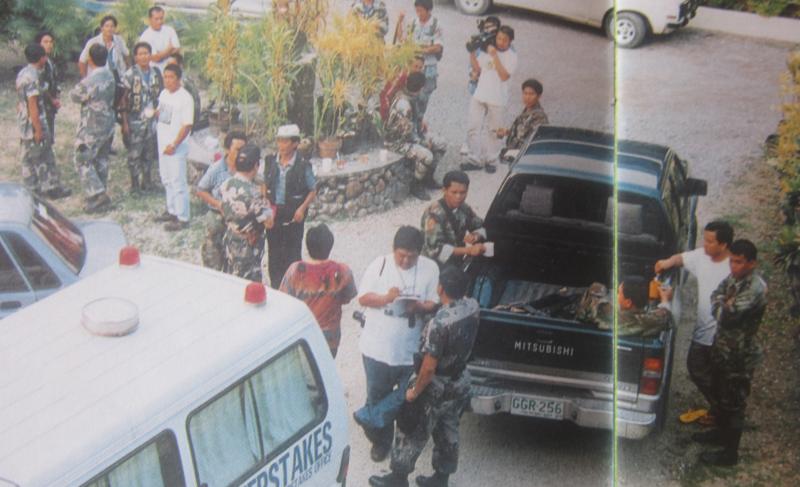
His days as hostage of Muslim rebels last year highlighted the difficulties of Fr. Des Hartford’s mission reconciliation.
On 7 November last, Fr. Des Hartford, Apostolic Administrator of Marawi in the Philippines, was released by his captors and walked for two hours through the forest of Mindanao to freedom. His ordeal began eleven days previously when he was abducted by former members of the Moro National Liberation Front. By their action they hoped to bring pressure on the government of the Philippines to fulfill promises made when an amnesty was signed some years ago. Fr. Hartford, who has worked for almost thirty years in the promotion of peace in this conflict area, represents the Catholic bishops on the Mindanao Tripartite Commission for dialogue.
During his captivity Fr. Des, one of six Catholic foreign missionaries to be kidnapped since 1991, was frequently moved from one location to another through swamps and forests and occasionally had to sleep open. On occasions, he, with his guars, had to flee from other armed gangs who wanted to take him prisoner fro their own purpose.
After his release Fr. Hartford emphasized, “I have many Muslims friends, and those friendships have in no way been diminished by what happened.” He visited Philippines President Fidel Ramos to thank him for respecting the appeal of Church leaders not to attempt a military solution to his kidnap. The President assured him that the conditions promised to the former rebels would be respected when some conditions had been fulfilled.
A reported asked Fr. Des if, during his captivity, he had ever thought of making a run for it. He replied that any temptation in this direction disappeared when he saw one of his guards shoot a bird (for dinner) through the neck at about 30 meters range.
About 40 Columban priests, sisters, and lay missionaries work in Mindanao, which has a population of approximately 17 million.
INQUIRER EDITORIAL
We don’t know much about the personal background of the missionary priest. A few things here and there; 54 years old; since 1991 Apostolic Administrator and acting bishops of the prelature in Marawi City, the heartland of the Muslim faith in the country; speaks the Maranaw language; native of Dublin, Ireland.
Tangkal, Lanao del Norte, where Hartford was held for almost eleven days, is as far as one can get from the city James Joyce made famous. This is the whole point of mission work, to go out into the world, as Christ commanded the first apostles, to spread the good news of salvation. Not to preach it as much as to make flesh the teaching of Christ, to embody the goodness of his humanity.
Historically, the Muslim have been particularly resistant to Christianity. Missionaries like Fr. Hartford toil in the vineyards of Mindanao by building on spiritual and cultural commonalities with the Muslims. Something Hartford said after his release indicates he had certainly established bonds with the Muslims. He spoke of his ‘un-islamic’ abductors betraying his trust... Invited my Muslim friends to a meeting he was instead taken captive, the personal betrayal made it ‘a very painful experience,’ he said, beyond, we suspect the hunger, the weariness, the uncertainty of his life-threatening situation.
Apart from the personal hurt, Hartford doesn’t blame his abductors and their religion. Instead he reminds the government to fully implement the rebel-returnee program. Failure to do so constitutes an injustice, a major reason for continued unrest between Christians and Muslims in Mindanao and Sulu. And Hartford plugged for continued networking between Muslim and Christians ‘to build lasting peace here in Mindanao and Sulu, that is based on justice, truth and love.’
Christians and Muslim don’t come any finer.
A Note of Thanks
Greetings from Marawi!
This is just a short note to thank you, the readers of Misyon and the people of the Philippines in general for your support for a while I was taken hostage, I was aware of being greatly strengthened by the power of God and I attribute this to the prayers of the people like yourselves. So I would just like to say thanks to all of you and thanks to God as the psalm says, “I thank you Lord because you heard me when I cried to you”May God Bless you.
Signed: Msgr, Des Hartford
In Giving You Will Receive
By Fr. John Griffin, ssc
One day in 1942 the whole school assembly at St. Kevin’s College in Oamaru, New Zealand sat riveted as two priests told of their lives as missionaries in Korea. More exciting for us young lads, their years in faraway Asia had recently included being held as prisoners of war by the Japanese who had finally released then for repatriation.
They were New Zealand Francis Herlihy and Hubert Hayward and this was the first I had ever heard of the Columban missionary society to which they belonged.
The following year was to be my last year at high school and the serious question of “Where next?” echoed in my mind. The answer came when the Columban missionary, Fr. Jim McGlynn, visited St. Kevin’s and said that the Columbans were opening a seminary for first year students in Lower Hutt near Wellington. The rest of their studies they would join the seminarians in Melbourne, Australia.
A few weeks later I wrote to them, expressing my aspirations. As well as encouraging me, Fr. McGlynn had a few questions, chiefly about my studies and my parents’ reaction to my plans.
Later in 1943 when I successfully passed my matriculation exam he invited me to present myself the following March, I moved north, expecting that I would be one of a small army of keen aspirant to missionary priesthood. There was just one other student!
I was ordained in Dunedin on July 25, 1950. When I returned to Corpus Christi to complete my studies I received word of my first mission assignment along with my classmate, John Walsh, I was to go to the Philippines.
We arrived in Manila by ship in May 1950 and were sent to join the team that had gone only two weeks earlier to a new Columban mission in province of Zambales, north west of Manila. A toss of a coin decided our placements. John Walsh went to Subic to study Tagalog while I was sent to San Antonio to grapple with the intricacies of Ilokano (a language brought to Zambales by earlier migrants from the two Ilokos provinces in Northern Luzon).
I stayed in Ilokano parishes in Zambales until 1970 when a medical emergency sent me back to New Zealand for the amputees of my right leg due to cancer. People still ask me how I felt when the doctor gave me his fateful decision. I can honestly say that when it comes to ‘Your leg or your life’ you waste no time in telling the doctor your preference!
My parents where there living in Auckland so I spent my recovery time at home with them. With an artificial limb plus a car adapted to my needs, I went to Lower Hutt in mid 1971 to join the Columban team there.
In 1974, I was seconded to head New Zealand’s National Missions Office When I completed that task in 1984 I volunteered for our mission in Chile. Following Spanish studies in Bolivia I moved down to my new assignment where I happily spent my next 10 years.
I am now back ‘on the road’ in Auckland doing the same work as I did in the South Island in the early 70’s. As I approach my 70th birthday and the 47th anniversary of my ordination, there is only joy I my heart as I as I review my life and thank God for so much.
I am particularly grateful that mine was a call to missionary priesthood which brought me close to other cultures and gave me the opportunity to be of service to people with lifestyle and values different from what I knew in New Zealand.
I’ve learned the truth of what we were told in the seminary: “You will receive much more than you will give; you will learn much more that you’ll teach.” I have no doubt that learning that truth and humbly accepting it has been my greatest experience as a missionary.
It Starts with a Dream
By Nelda Natividad
The Legion of Mary in the Philippines has been sending out Incolae (the plural of Incola!) or lay missionaries to Micronesia and Melanesia for some years now. These lay missionaries support themselves and help strengthen the Church through the Legion of Mary. Nelda Natividad tells us how she has now moved on from being an Incola (part time missionary) to extension worker.
A Dream
As Incola Mariae volunteer, I started as a College Teacher at the Divine Word Institutes in Madang, Papua New Guinea. With fellow Incola-teachers, I organized praesidia among the students and other teachers. When my contact with the school, I was fortunate to get a job where my training as a Certified Accountant would be of use.
As an accountant in a travel agency, I was able to facilitate priest who wanted to fly up to Madang for seminars. This gave me the opportunity to talk to them about the Legion of Mary. Some of them were Filipino Missionaries. My daily two-hour apostolate for the Legion of Mary could easily be attended to with my desk job. And any other spare day or weekend was spent meeting local Legionaries and even visiting for the Comitium. I learned how to drive too and having a car was a blessing in such a huge territory.
Most missions parishes do have a praesidium or two and I realized their potentials if the members could be encouraged to learn more about the Legion. My limited time would not allow a closer ‘learning together,’ so I began to have a dream.
Full-time
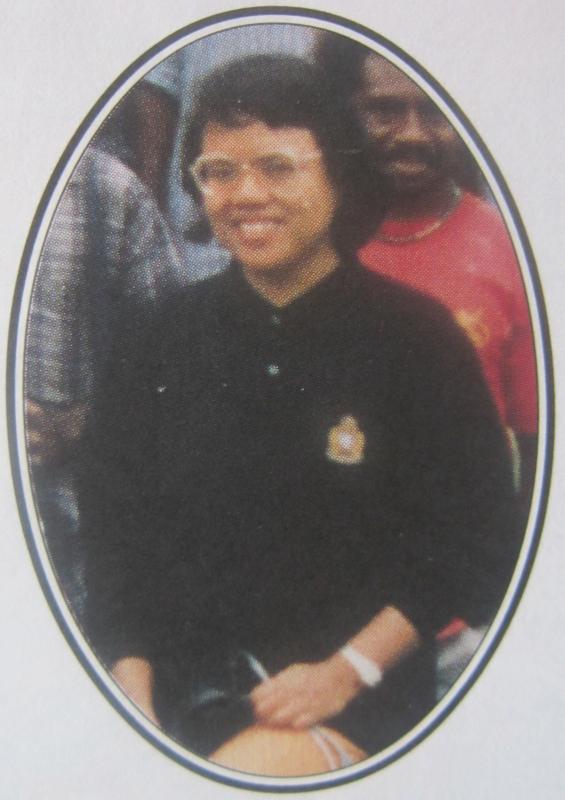
It was a blessing when I finally received the appointment from the Concilium in Ireland. However, I could not start with my full time apostolate unless my ‘working’ visa was duly updated and the paper work took nearly four months! I was very hopeful that everything would workout well since I had totally placed my ‘dream’ in Our Lady’s hands.
No Time to be Afraid
By September, I was ready to move about, among legionaries and undertake full-time duties as Extension Worker and I learned now to keep a diary. The 4-month period of waiting for my visa was spent polishing my pidgin English and now, I saw the great advantage of communicating with local Legionaries in their native tongue. There is instant warmth of a welcome when you speak the local language.
I was soon sent by the Legion to councils and praesidia in adjacent provinces. Please not that the country is a huge mission area thus traveling from one mission post to another takes a day or so, along rough roads or sailing across and long the many rivers. There is no time to be frightened. We pray for a safe journey and therefore hope to reach our destination before the sun sets. How I enjoyed these sailing to and fro.
Another blessing – how eager the Legionaries are to learn more about the Legion of Mary. They welcomed the stress given to the Standing Instructions which made the whole system easy to put into practice.
My appointment is only for one year and how fast time flies. Perhaps other legionaries may nurture the same dream of giving, a year or two to the missions. Extension work not only means new recruits and new praesidia. It also means more workers for the Church.
Maria Aparecida
By Sr. Alice Lansang, icm
Let me tell you about a peasant woman in Brazil, Maria Aparecida, who has taught me to be a disciple.
Alcohol and Jealousy
Her quiet strength, her enduring patience wells up from her deep faith. Countless times I have heard her say, “I have faith in God...” that Ze, her husband, would be cured of alcoholism. Poisoned by the bottle and jealousy; Ze tried to prevent her participation in the community. Yet courageously she managed to fulfill her different tasks as wife, mother and community leader.
For Maria, forgiving, the heart of Christian living, was no idle word. Maria incarnated it, never despairing, ever suffering, ever hoping in the Spirit for the day her man would turn from his womanizing ways. And then it came to pass. He did start a new life and not only that, now they are in marriage encounters together.
Community organizing
“I can do all things in the one who strengthens me.” This confidence of St. Paul the apostle lies in Maria Aparecida, enabling her to face the problems of community. Though unschooled, and unlettered, she was undaunted by the men’s opposition to her organizing the residents. Nevertheless, ten years of persistent persuasion and struggle for the rights of dwellers on the hillside of Lambicada has transformed the community.
Today Lambicada has a school, electricity, paved roads and water services. It took countless trips and negotiations with city authorities, as well as members.
Political Awareness
Her reflection in our bible groups moves the listeners because her faith is interlinked with life and political reality. I marvel at how she has understood the complexity of Brazil’s situation and discerned which political party was right for the nation. She then proceeded to enlighten and educate the community. As a missionary in Latin America, I can identify with this commitment – to live my faith, my religious vocation concretely within a political dimension.
Maria, is a woman of prayer. Her serene smile and they joy in her eyes reflects her awareness that she is lobed by a bountiful Father. Though life has not been kind to her, her prayers at celebrations and bible reflections are often prayers of thanksgiving and gratitude.
So too do I give thanks, O God, for Your abiding presence, your constant companionship as I met in wonderful women like Maria Aparecida. Amen.
Of Rising Moons and Flaming Trees
By Sr. Emma de Guzman, icm
The days before Christmas had been extremely warm and heavy. And while the other parts of the world are coated in snow as Christmas approaches, the whole of creation in this part of the world is covered with omnipresent red dust, any passing vehicle creates its own clouds of red dust that settles on the leaves of every tree so that they appear to be made -up in red! One can understand why the houses are made red clay mud; this is the season of the year when red clay is joined to red dust, even the homes made of cement walls and painted take on another coating of the season’s red.
I sat with a glass of water in my hands at the end of the day of December 24 under the blooming flame tree in front of our house to take a breather. It was almost 6 p.m. and we would soon be praying Vespers. I allowed myself to feel the quiet that had started to settle in the Missions. I was admiring the beauty of the red flame tree thinking how it can help give an air of Christmas in our living room and in the Church. Suddenly my thoughts went home and I felt the homesickness of being away at Christmas. I normally do not feel homesick as this is almost my 22nd Christmas away from home. Strange that it should be the ordinary trappings of Christmas at home that I miss; Nativity scenes; Christmas stars hanging in every home; Christmas carols; Misa de Gallo; all that which I was used to these are things that we don’t have here in Cameroon. In Africa these customs are not part of the culture. As I daydreamed of Christmas...Christmas at home, my gaze went beyond the palm tree in front of the Church. Everything around was clean; the palm tree plantation had been spruced up like a park and I remembered I should go in there for a walk. My gaze went beyond and far... to the Far East, to my country of origin, to the Philippines. I was gazing far into the horizon when slowly a big ball of quit fire started rising in front of me. For an instant, I got confused at which part of the day I was dreaming in: Sunrise? Sunset? It was captivating scene, then I realized it was the moon and it was rising at its fullest.
I looked back at my red flame tree, and the next one; they were flaunting their colors while the full moon rose up majestically as if saying: “It’s my own turn to show my splendor.” I’ve walked under the moonlight and I knew the moon was there at night but this is the first time I saw her coming on stage as early as 6 p.m. This one of the wonders of Africa: unpredictable, full of surprises, colorful. I can understand why everyone dances at full moon; this is surely a time of celebrating with nature, almost instantly I had forgotten why I seated myself under the flame tree with its red covered bough. I was awestruck with the rising moon curtained by the leaves of he palm trees.
It was an inspiration and to think that I almost missed it in a moment of homesickness. This is an unforgettable Christmas, decked, not with artificial ornaments but with nature’s beauty, at my feet, all around me, My heart instantly thanked God for this s beauty and for touching my hear to see it. Christmas in Okola has its own God-made decorations: gorgeous flame tree and the brilliant exuberant rising moon.
The Maasai of Kenya
By Fr. Eufemio Sombrio, svd
In nearly forty years, this is my first time to celebrate Christmas away form my homeland. Before I left for Africa last January, I already heard reports from many missionaries abroad that indeed there is no place like home especially in terms of celebrating Christmas. Now that I am a Filipino in Africa, I’d rather say that Christmas in Kenya compared to the Philippines is both similar and different. Different because of our cultural traditions like the Misa de Gallo, like listening to Christmas songs as early as the month of September, or house-to-house caroling. But it is also similar because the message of Christmas to the Africans remains the same that “the WORD was made FLESH and DWELT among us.”
I wish to share with you a couple of experiences I encountered here in Kenya during my first year of being a missionary.
Maasai
Regarding a MAASAI visitor from one of the many tribes. He comes to see the rector of the seminary. In their conversation this Maasai said to the rector, “Edward is very pleased to see you and he would like to sell you these Maasai made arm ornaments. (The type of ornaments they make, which we in the Philippines call “pulseras”, are made out of colorful beads exactly like those made by the Mangyans in Mindoro and the Manobos in Agusan.) Then the rector asked him: “When did Edward and I meet each other? And who is he?” “Edward is a Maasai and he is talking to you now, the visitor replied. We discovered then that any Maasai would never mention the first person pronouns “I” or “me” in front of a ‘big man’ of the community. The reason for this cultural expression is their high respect for the big man or leader of a tribe.
Community Property
Still about the Maasai tribe. They have a strong belief that every cow is God’s gift to their tribe. And so they have the RIGHT to take any cow and slaughter it. Those who do not know about this would accuse the Maasai of being thieves of cows and so other tribes who are raising cows would either put the cows inside the fence or keep an eye on them while grazing. This reminds me of our Manobo tribe when I was in Loreto, Agusan del Sur. For a genuine Manobo (no influenced or exposed to urban culture) property is common, not private.
Respect for Life
For the Africans, women, especially mothers, are life-givers and they cannot allow themselves to kill even the life of an animal. One day a missionary visited a mother and her son. It was lunch time and out of their hospitality they thought of butchering their chicken. And so she carried her son at her back, let him hold the knife, and she drove the hands of her son to cut the neck of the chicken. That they look strange to us, but at heart, it is a beautiful sign of respect for life which the whole world needs today.

